Land Of The Reasonably Priced
Format: PC.
Developer: Positech Games.
Publisher: Positech Games.
The cornerstone of our society. The very lifeblood of the people. A tradition in this fair land that has existed for hundreds of years. I am, of course, talking about muff-diving.
Um. Disregard.
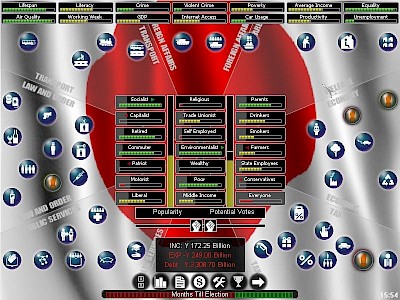
The state of the country is represented by fourteen different qualities, including but not limited to; equality, unemployment, GDP, crime, literacy, etcetera, etcetera. These are an indicator of what sort of shape your country is in, but just because these babies are all in the green does not mean all the voters are happy with you...
The electorate is composed of many different groups such as capitalists, farmers, commuters, drinkers and of course one voter may belong to several different groups. The possibility of a wealthy environmentalist conservative farmer who commutes to work raises some questions in my mind, but what do I know, eh? Each group is affected by policies, crisisisisis and dilemmas as the game progresses in turn-based fashion, each turn taking three months, with an election every few years.
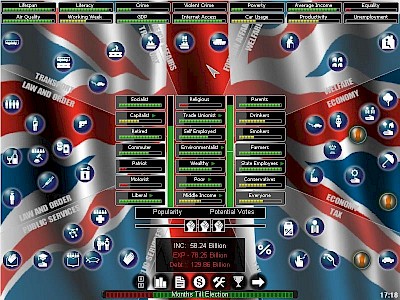
Crises are random events that pop up to really incite the mob to burn you alive. They range from pirates sinking a fishing boat (well done on decreasing the military budget) to an outbreak of mad cow disease (well done on, er, decreasing the budget for livestock psychiatric assistance). Each crisis comes with a graph showing its effect over time and some even have a nice little list of possible solutions, though some you just have to suffer, which I thought was rather apt.
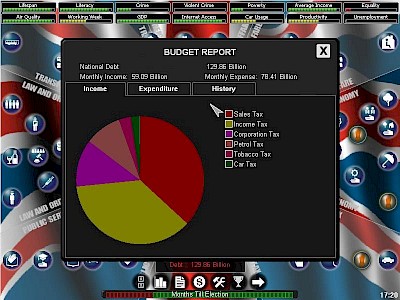
Thinking to curtail the national debt, I cut the rail budget and giggled myself silly, heading into the election confidently, only to have the rail workers go on fucking strike. This lost me the election, by a margin narrower than a fly's bollocks. Needless to say, I was not pleased, and when the Stalin mod comes out I'm going to have the fucking lot of them shot.
You have to plan ahead. You have to look at your decisions, and weigh up if you can neutralise the negative and emphasise the positive before the next election arrives. Some policies are so long-range that they don't really pay off until several terms of government have passed, meaning you have to go elsewhere to get enough goodwill to be re-elected. It's a tricky balancing act, on several levels. Increase existing taxes, or introduce new ones and you increase funds for new policies, but inevitably piss some voters off. Decrease taxes and you have less ability to help the sections of your country that need it most.
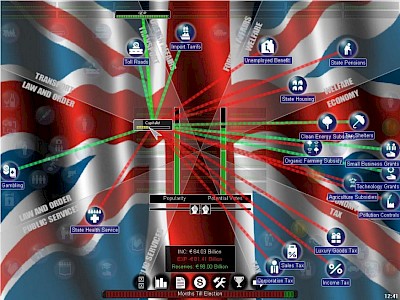
Moving on!
Everything is related. The graphics display this clearly. You cannot wiggle Widget A without Widgets B and C wiggling in sympathy. So you must counteract Widgets B and C with more widget-wiggling in order to get the benefit from the wiggling of Widget A. Ad infinitum.
Enough with the widget analogy.
There are some small flaws, mistakes with spelling and grammar, no pop-up boxes when there should be pop-up boxes, but nothing particularly important. There are no whiz-bang 3D graphics, I'm afraid. No antistroboscopic lighting, no hydrodynamic water fluctuation modelling, no realistic antigravitational testicle simulation, no nothing. There are graphs. There are pie charts. There are sliders. You do not get to throw your political opponents three hundred feet in the air and set fire to them, before letting them land in the latest crumple of ragdoll physics, however cool that would be. The main interface and quarterly report make your popularity, budget, and important issues crystal clear. This is where you will be spending most of your time, so this is good. Each loading screen gives you an amusing quote from a political figure, including the "Our world is safer with nuclear weapons." gem from 'Mad' Maggie Thatcher.
The music ranges from inoffensive to annoying, and can be turned off and quickly replaced with tunage of your own. The sound effects are minimal, though you get a nice round of applause or booing with several issues, which I enjoyed (shouting "Who's in power now, you cunts!?" is optional, though).
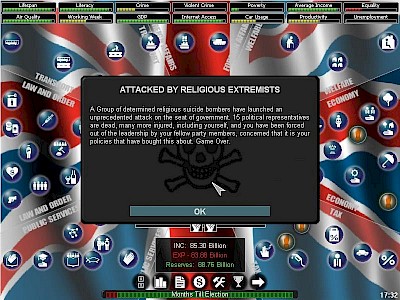
It's not all roses. Games of this ilk need depth, and buckets of it, and Democracy is not quite there. There is a fair bit of repetition where the dilemmas and crises are concerned. Not very many of them are nation-specific, either, so you'll find the majority of the issues coming up whichever country you play, though the different sizes of the voter groups in each country's electorate does mean a slightly different approach must be used. Apparently the game is simplicity itself to mod, so you can add your own policies, countries, crises, you name it you can have it, with little trouble. But the game doesn't model quite enough to be encyclopaedic. There's no sign of population growth, increase/decline of the voter groups, relations with foreign countries...the list goes on.
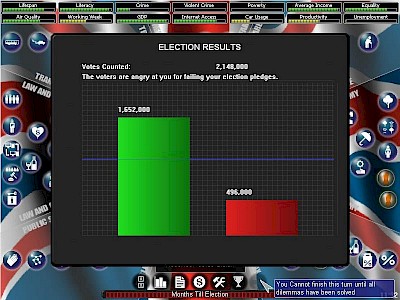
Democracy is not an essential purchase, but it is a game worth buying. It's fun, and it'll educate you more fully on the workings of politics and economics ("No, Mum, it really will help me with my homework."). Considering Positech Games is one bloke, Democracy is a brave move against the embedded corporate structure of the games industry. It is entirely free of flash and glamour, and it's available for fuck all ('fuck all' currently equates to £12.19 and various amounts in those weird foreign currencies). It is to be applauded for being honest, and relying solely upon its gameplay. There is an update available, adding the EU and Portugal to the list of countries, as well as several dilemmas, policies and crises, and no doubt there will be regular updates to come in future.
Democracy, in this instance, truly is a device that ensures we shall be governed no better than we deserve. If we, as gamers, continue to vote with our wallets as we have done so far, then we will get the gaming industry, and by extension the games, we deserve.
